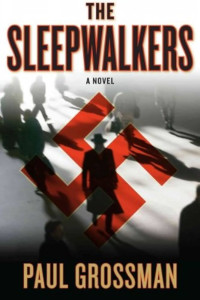 I must be attracting novels about Nazi Germany for a reason. Sometimes I feel like I have an alternate life in 1930s Berlin, on that terrifying cusp between the Weimar Republic and the Third Reich.
I must be attracting novels about Nazi Germany for a reason. Sometimes I feel like I have an alternate life in 1930s Berlin, on that terrifying cusp between the Weimar Republic and the Third Reich.
My husband found The Sleepwalkers in a pile of advance readers’ editions in the basement storage room of our favorite local independent bookstore and of course brought it home for me. I’d just finished reviewing the Bernie Gunther series and the latest offerings from David Downing and Rebecca Cantrell. So there I was, back in the old same place, walking in the Tiergarten, hopping the U-Bahn, dodging traffic on the Alexanderplatz, dining at the Adlon Hotel, looking up at the Brandenburg Gate, hoping that the polizei or the Brownshirts wouldn’t notice me.
Oh, dear, this is getting too weird! Pretty soon I’ll start having dreams about this stuff.
Like the books I mentioned above, The Sleepwalkers is a murder mystery with strong elements of suspense thriller thrown in. The main character is Inspektor-Detektiv Willi Kraus, a decorated officer in the criminal investigation division of the Berlin Police Department who happens to be a Jew. Like Bernie Gunther (with whom I can easily imagine him working on a case), Willi is in his thirties and served in the First World War, earning an Iron Cross for his bravery on the battlefield. Willi is a widower with two young sons who are in the care of his late wife’s parents and younger sister Ava. (Just to make everything more confusing for me, Willi’s junior partner on the force is named Gunther.)
In the novel’s opening pages, Willi is called upon to investigate the suspicious death of a young woman pulled from the Havel River near Old Spandau, a Berlin suburb. He immediately notices a deformity in her legs; in fact some of the other police on site have nicknamed her the Mermaid. In conducting the autopsy, the pathologist determines that her shinbones have been surgically removed and reattached to the opposite legs. While the pathologist found the bone grafting to be highly advanced, he also noted that the surgery would have made it nearly impossible for the victim to walk.
The very next day, Willi receives a call to meet with General Paul von Hindenburg, the President of Germany, who assigns him to investigate a missing persons case that soon ties in directly with the Mermaid case. As he delves deeper and deeper into his investigation, Willi befriends a bootgirl (dominatrix sex worker) named Putzi, becomes suspicious of a famous stage hypnotist who enjoys close ties to the Nazi leadership, and finally discovers the site of an early concentration camp where a number of doctors are carrying out painful and ultimately lethal experiments on their prisoners.
Although I have read a lot of novels that capture the look and feel of 1930s Berlin (as I have seen it depicted in film and still photographs) rather well, I have to acknowledge Paul Grossman for his detailed and compelling descriptions of particular locales. In a paragraph of a baker’s dozen lines, he draws a very clear picture of the Alexanderplatz. I’d never realized before that it was the home of the city’s two largest department stores (Wertheim and Tietz) as well as the police station. When Willi rides the S-Bahn out to Spandau, Grossman provides a lyrical description of the urban scenes that roll past the windows of the commuter train.
Many authors of historical fiction include real historical figures as minor characters to lend authenticity. I’ve already mentioned General von Hindenburg. Ernst Roehm, head of the ill-fated SA and a man I learned to hate in Rebecca Cantrell’s novels, makes a brief appearance in The Sleepwalkers as the companion of a young homosexual whom Willi uses as an informant. At a dinner at the Kaiserhof, Willi sights Adolf Hitler in the company of his henchmen Goring, Goebbels, and Strasser. They send chills down Willi’s spine, as they always do down mine. About the only scene in which I found Grossman’s use of historical figures rather overdone and contrived was a scene in Romanisches Café, where Willi encounters Max Reinhardt, Bertholt Brecht, Thomas Mann and Albert Einstein all having coffee. That really was too much!
Even by the standards of this subgenre (Third Reich murder mysteries), The Sleepwalkers is a very dark tale. I’ve already alluded to the concentration camp and the Nazi experiments. The plot opens in November 1932, just a few months before the near-coup that brought Adolf Hitler and his minions to political power. All of Willi’s Jewish friends, and most of his anti-Nazi Gentile friends, are either leaving Germany or living in strenuous denial that the situation is as bad as it really is – until they run out of options. Grossman makes very good use of the conflagration that destroyed much of the Reichstag (Parliament assembly hall) on February 27, 1933, to enhance the terror that rises at the story’s climax.
Several times throughout The Sleepwalkers, Grossman refers to an earlier case that Willi worked on, cryptically and disturbingly known as the Child Eater. I could certainly imagine a prequel coming out of this. Given the complete impossibility of any Jew serving in the Berlin polizei after 1933, or even surviving as a private detective or security officer (as Bernie Gunther managed to do), I am not sure how Grossman could write sequels in a comparable “Berlin noir” style. Besides, in a brief epilogue, Grossman relates that Willi escaped to Paris (he had already sent his sons and other family members there) and emigrated to Tel Aviv two years before the Nazi occupation of France. Well, those are reasonable settings for murder mysteries, too!
(St. Martin’s Press)
